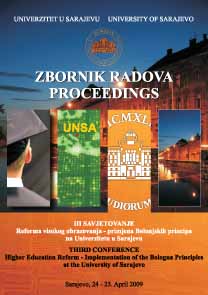Potreba pedagoškog naučnog praćenja realizacije Bolonjskog reformskog procesa
Necessity of Pedagogical Scientific Monitoring of the Bologna Process Implementation
Author(s): Adila Pašalić-KresoSubject(s): Social Sciences
Published by: Univerzitet u Sarajevu
Summary/Abstract: Pedagogical scientific research and monitoring of the reform processes underway in Bosnia and Herzegovina, at all levels, including the level of higher education, are unjustifiably and incomprehensibly neglected and pushed to the margins. This relationship towards sciences that are fundamental for studying the very core of the educational process can backfire like a strong boomerang and, against our best intentions, it may impact many, still fragile constructs and results of the reform process. Today, consequences are felt in the field of higher education, in almost every serious issue imposed by the Bologna Reform, because of the lack of awareness of the need and importance of pedagogical research. A country without its own educational research is in danger of accepting anything that is offered, regardless of the capacities of a proper implementation of all of the segments accepted. Without scientific insights into the own educational reality, a country most frequently becomes a place for recycling others’ ideas that may be unfounded or even rejected, with questionable educational outcomes. Lack of understanding and acceptance of the need to include pedagogical scientific research may result in a „culture“ of over-dimensioning the significance of what is being learned while minimizing the content being learnt. As a result, a common belief is formed that the end of the education process is marked by receiving one’s diploma, while the results of such an education process lead higher-education institutions onto the wrong path in creating and selecting the younger scientific generations. The Bologna reform process, according to its starting points and ideas, includes: unification of the European educational and scientific-research space, increase of communication between teachers and students, creating preconditions for diplomas accepted throughout the European space, striving to ensure quality is in its very core revolutionary-progressive. It opens up perspectives to teachers and students and scientific projects while bringing promises that could recently only be dreamed of. However, this opening of perspectives should not make higher education turn a deaf ear to many necessary changes in ensuring a higher-quality educational practice and its outcomes. Without pedagogical scientific monitoring, this may be bound to happen, if it has not happened by now.
Journal: Zbornik radova - Univerzitet u Sarajevu
- Issue Year: 2009
- Issue No: 03
- Page Range: 243-254
- Page Count: 12
- Language: Bosnian

